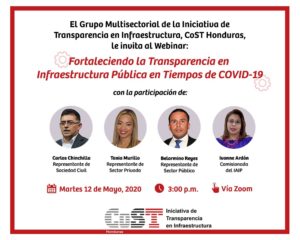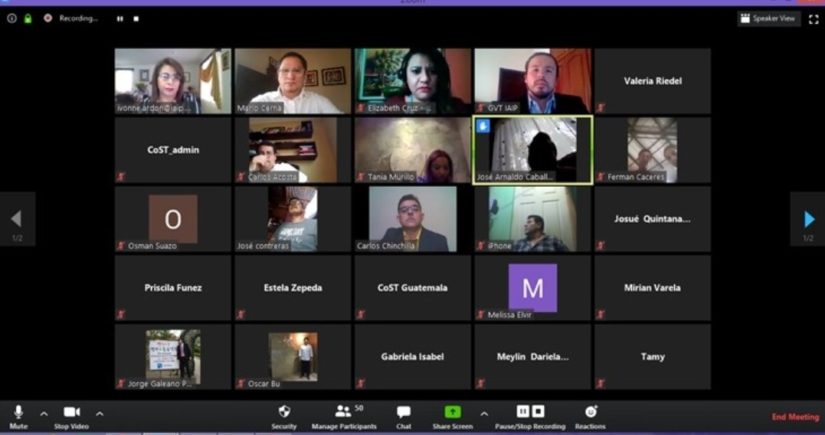CoST Honduras hosted a webinar this week, attended by representatives from the private sector, civil society, media, Citizen Transparency Commissions (CTCs) and academia. In total 50 people from half a dozen countries across Latin America participated, with a panel consisting of representatives from CoST Honduras’s multi-stakeholder group (MSG) and Ivonne Ardón, the Commissioner of Honduras’s Institute for Access to Public Information (IAIP). The webinar provided a platform to explore a key question faced globally: how can public infrastructure funding, designed to mitigate the impact of the pandemic, be dispersed transparently?
President of Honduras calls on CoST to bolster transparency
The scale of the COVID-19 crisis has required unprecedented emergency funding packages: on March 13, the Honduran Congress approved an emergency plan of  more than US $420m for the country’s pandemic response, which includes building new healthcare infrastructure. Seven mobile hospitals acquired as part of this plan have already been at the centre of criticism: despite a cost of US $47 million, time overruns mean they will not be operational until July. In a speech in March, President Hernández cited CoST Honduras as part of plans to maintain oversight in the procurement of hospital facilities such as these. CoST’s track record in increasing accountability, building trust and reducing costs is more pertinent now than ever.
more than US $420m for the country’s pandemic response, which includes building new healthcare infrastructure. Seven mobile hospitals acquired as part of this plan have already been at the centre of criticism: despite a cost of US $47 million, time overruns mean they will not be operational until July. In a speech in March, President Hernández cited CoST Honduras as part of plans to maintain oversight in the procurement of hospital facilities such as these. CoST’s track record in increasing accountability, building trust and reducing costs is more pertinent now than ever.
To this end, the webinar participants highlighted the need to strengthen oversight of spending from central government, decentralised institutions and municipalities alike as they implement infrastructure projects. With regards to the seven mobile hospitals, CoST Honduras MSG member Tania Murillo explained there is ongoing dialogue with the government investment body Invest-H, to guarantee information for this project is published on SISOCS. This guarantee will extend to all health infrastructure investments carried out by Invest-H as a result of COVID-19. Furthermore, it has been specified that any documents published are written in Spanish, as those which have been published on IAIP’s portal so far have been in English and Korean.
Pandemic reduces citizen oversight
Osman Suazo, representative of the Atlántida CTC, pointed out that attention must be paid not only to projects in the COVID-19 response but also to other infrastructure works which ‘’are being carried out without the necessary citizen oversight”. Referencing the Calle 8 project at La Ceiba and the repair of the Río Danto Bridge, he said authorities and contractors “are taking advantage of the emergency to steamroll other infrastructure projects’’. CoST Honduras’s civil society MSG representative, Carlos Chinchilla, said he would propose including the aforementioned projects in the next CoST Honduras assurance process.
Going forward, CoST Honduras’s challenge will be to ensure oversight capacity during this time of high public investment is strengthened, a challenge exacerbated by social distancing which limits social accountability stakeholders – such as CTCs – from monitoring projects. As COVID-19 exacerbates the opaque nature of infrastructure investment and procurement, promoting the key tenets of CoST will become ever more necessary.
